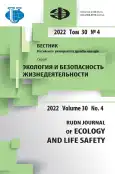The system of factors of anthropogenic impact on the fish fauna of the Northern Dvina river basin
- Authors: Tortsev A.M.1
-
Affiliations:
- N. Laverov Federal Center for Integrated Arctic Research of the Ural Branch of the Russian Academy of Science
- Issue: Vol 30, No 4 (2022)
- Pages: 606-619
- Section: Biological resources
- URL: https://journal-vniispk.ru/2313-2310/article/view/323973
- DOI: https://doi.org/10.22363/2313-2310-2022-30-4-606-619
- ID: 323973
Cite item
Full Text
Abstract
Industry, electric power, utilities, agriculture, mining, construction, shipbuilding, transport and fishing have a constant anthropogenic impact on the Northern Dvina river basin. Identification and qualitative assessment of factors of anthropogenic impact on the fish fauna of the Northern Dvina river basin within the boundaries of the Arkhangelsk region is the aim of the research. Open data of public authorities on anthropogenic impact and scientific publications are the basis for the research. The main factors of anthropogenic impact on fish fauna have been identified. The impact is multifactorial. Fishing reduces the number of fish populations, and economic activities in the water area and the banks of the water body worsen the conditions of the fish habitat. This leads to a change in the parameters of fish populations. Reconstruction of existing wastewater systems and construction of new ones, as well as the introduction of restrictions on the use of forest resources in the coastal zone are directions for reducing the anthropogenic impact.
Keywords
About the authors
Alexey M. Tortsev
N. Laverov Federal Center for Integrated Arctic Research of the Ural Branch of the Russian Academy of Science
Author for correspondence.
Email: torzevalex@yandex.ru
ORCID iD: 0000-0002-2329-0042
Cand. Sc. Biology, Senior Researcher
23 Severnaya Dvina Embankment, Arkhangelsk, 163000, Russian FederationReferences
- Demidenko NA. Modern features of the hydrological regime of the mouth areas of the rivers of the White Sea basin. In: Changing climate and socio-economic potential of the Russian Arctic. Moscow; 2016:95–145. (In Russ.)
- Novoselov AP, Studenov II. Factors of technogenic impact on the Northern Dvina river basin. Bulletin of the Northern (Arctic) Federal University. Series: Natural Sciences. 2014;(2):32–40. (In Russ.)
- Nikanorov AM, Bryzgalo VA, Reshetnyak OS, Kondakova MYu. Transport of pollutants along large rivers of the European North and Siberia. Water resources. 2015;42(3):279–287. (In Russ.)
- Nikanorov AM. On the selective response of aquatic ecosystems to anthropogenic impact. Reports of the Academy of Sciences. 2014;459(4):504. (In Russ.)
- Novoselov AP, Studenov II. The current state of commercial ichthyofauna in freshwater reservoirs of the Northern fishery basin. Fish farming and fisheries. 2015;(10):10–18. (In Russ.)
- Leman V.N., Kobyakov K.N., Vinnikov A.V. Protective forests and conservation of water biological resources. Sustainable Forest Management. 2018;(1):2–10. (In Russ.)
- Shilov N.I., Borovlev A.O. Assessment of potential risks for Atlantic salmon populations in the event of a reduction in the area of spawning forest belts in the Northern Fishery Basin. Sustainable Forest Management. 2019;(2):5–13. (In Russ.)
- Soromotin AV, Kudryavtsev AA, Efimova AA, Gerter OV, Fefilov NN. Background content of heavy metals in the water of small rivers of the Nadym-Purovsky interfluve. Geoecology. Engineering geology. Hydrogeology. Geocryology. 2019;(2):48–55. http://doi.org/10.31857/S0869-78092019248-55 (In Russ.)
- Tortseva TV, Tortsev AM. Anthropogenic pollution of water bodies in the Arctic zone of the Russian Federation in the context of increased development of natural resources. Biodiversity, state and dynamics of natural and anthropogenic ecosystems in Russia. Materials of the All-Russian scientific-practical conference. Komsomolsk-on-Amur; 2021. Р. 201–205. (In Russ.)
- Perhurova JV, editor. Report «The state and environmental protection of the Arkhangelsk region for 2020»; State Budgetary Institution of the Arkhangelsk Region «Center for Nature Management and Environmental Protection». Arkhangelsk: NARFU Publ.; 2021:478. (In Russ.)
- Balushkina EB. Changes in the structure of benthic animal communities under anthropogenic impact on aquatic ecosystems (on the example of small rivers in the Leningrad Region). Eurasian Entomological Journal. 2004;3(4):276–282. (In Russ.)
- Reshetnyak OS, Reshetnyak NV, Reshetnyak VN. The state of the ecosystem of the Lower Don in modern conditions of anthropogenic impact. Ecology. Economy. Informatics. Series: Geoinformation technologies and space monitoring. 2019;(4):234–240. (In Russ.)
- Moiseenko TI, Gashkina NA, Sharov AN, Vandysh OI, Kudryavtseva LP. Anthropogenic transformation of the Arctic ecosystem of Lake Imandra: trends towards recovery after a long period of pollution. Water resources. 2009;36(3):312–325. (In Russ.)
- Bogdanov VD, Bogdanova EN, Melnichenko IP, Stepanov LN, Yarushina MI. Problems of protection of bioresources during the development of the Bovanenkovskoye gas condensate field. Economics of the region. 2012;(4):68–79. (In Russ.)
- Zinoviev EA, Kitaev AB. On the impact of suspended particles on hydrofauna. Proceedings of the Samara Scientific Center of the Russian Academy of Sciences. 2015;17(5):283–288. (In Russ.)
- Zakharov AB, Ponomarev VI, Loskutova OA, Shubina VN. Influence of operation of land and water transport on the biological resources of the mountain rivers of the national park «Yugyd Va». News of the Komi Science Center of the Ural Branch of the Russian Academy of Sciences. 2015;1(21):26–31. (In Russ.)
Supplementary files









